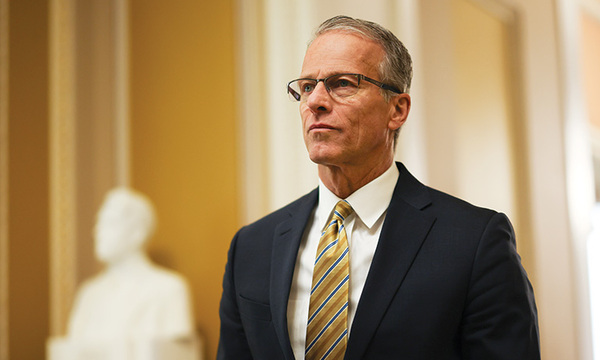One of the rising voices in the contemporary worship music scene is John Mark McMillan, a North Carolina-based songwriter whose new hit album, The Medicine, came out this summer and spawned the singles “Skeleton Bones” and “Death in His Grave.”
You may have heard McMillan’s song “How He Loves,” which is quickly becoming a staple in church worship services. McMillan wrote the song several years ago the day after his friend Stephen was killed in a car accident. A song about the immense love of God for us even in the midst of our brokenness, “How He Loves” has been covered by the likes of David Crowder, Kim Walker, Todd Agnew and Flyleaf. Watch McMillan describe the story behind “How He Loves” in this video.
McMillan recently spoke with Biola Magazine from his home in Charlotte, N.C., about his music, his mission and his thoughts on the contemporary worship industry.
Thanks for taking some time to chat. You’re probably a very sought-after person these days. Congratulations on the success of the new album!

Yeah, I didn’t really know what to expect. Technically it’s a re-release, so I was a little worried about whether my core crowd was going to get behind it and push it, but they definitely did. It’s been a really good start.
How would you describe your new album to someone who’s never heard you before? Would you describe it as worship or Christian music?
Well, in my mind I don’t really differentiate. I think there is music, and there are people who make it, and I think people who make good music sing about what’s important to them. Jesus and the story of the man Jesus are important to me, so that’s why I write about it. I know I may be a little over-the-top here, but I really don’t like to describe music as “Christian” or “worship,” because I just don’t think they are very good descriptions of the music. I think they’re pretty good descriptions of people, or they should be.
How would you describe the sound of the album?
It’s got a little bit of a roots-rock feel. I like the sounds of old music. I don’t like a lot of new music. We tried to record it in a way that sounds like the old albums I really love — old Springsteen or Dylan albums. Springsteen was a huge influence on the album. I was listening to a lot of the “new folk” stuff a few summers ago — people like Ryan Adams and Conor Oberst. There’s also a little bit of new wave ’80s influence. The guitar player listens to a lot of the really early U2 stuff.
Do you currently, or have you ever, led worship as a job for a congregation?
Yeah, I do that a lot. A good bit of what we do is leading worship. We don’t do a lot of cover songs, but we do a lot of the songs that we have written, or older hymns. I love hymns. There’s a church in town that I attend — a church my father and I started a few months ago — which we haven’t marketed or promoted in any way. I don’t want people coming because it is “John Mark’s church,” but because it’s a relational place where people have an opportunity to grow with one another. I lead worship there, and we write songs for that crowd of people, and it’s fun.
You wrote the song “How He Loves,” which is now a major hit. Is it weird to you that a song you wrote is now being sung in churches throughout the world every Sunday?
It’s very weird. I think it’s awesome, but yeah — I didn’t even know when I was writing it what I was going to do with it. I was pretty disconnected from that whole world, and didn’t realize that song had such appeal. I wrote that song eight years ago, and played it for a few record company people and they said, “This will never be a single.” And I understood. So it’s really funny, especially this much later. We stopped playing that song a few years ago, and then Kim Walker recorded it on the West Coast and people started wanting to hear it again, so we started playing it again. And then we stopped playing it again, and then David Crowder covered it so we picked it up again. It’s not that we don’t enjoy playing it; it’s just that we played it and then it worked itself out of the set. But now that people are so excited about it, we’re happy to bring it back.
Is it true you wrote “How He Loves” the morning after your friend Stephen died?
Yeah, I was down in Jacksonville for a recording session. They were in the accident the previous night, and we found out they were in the hospital. But I didn’t find out the extent of it until late that night. I stayed up most of the night, woke up the next morning and didn’t have a lot to do. We were stuck in a house in Jacksonville. What do you do? You don’t prepare for those kinds of things. So I was just sitting around and picked up my guitar and my journal, and I saw a few lines that I had written and I thought they felt like right now, so I started singing around them, and the song basically came.
The song has different layers to me. I don’t ever think a song has to have one meaning, so when I wrote the song I wasn’t really sure what was going on. You sort of have this picture of someone meeting Jesus, so in my mind I guess it could have been Stephen meeting Jesus, or it could have been me.
Why do you think the song has resonated so much with so many people? I mean, it’s a very personal song to you, and yet so many people worship through it.
I think for me the real reason it’s connected with so many people is that the tone of the song has given people the opportunity to have a conversation in worship that maybe they haven’t had before. The tone of the song isn’t this happy, puppy-dogs-kitty-cats feeling. I wrote the song out of my friend dying, and the song brought healing to me, so I think it’s given a lot of people permission to have those sorts of conversations. It’s like, it doesn’t honor God to pretend like everything is OK. That’s the beauty of Jesus that so many people miss. The beauty is that he died on the cross for our sins, but also that he existed the way we exist. He understands what it’s like to lose a friend. He’s not unfamiliar with those emotions. He’s not unfamiliar with the difficulty of human life. To me that’s what makes Jesus as God beautiful. He totally understands. He went out of his way to prove to us that he understands our situation. So when he has something to say, it’s not coming from this high and lofty standpoint. It’s coming from this person who understands intricately the perils of human existence. I don’t know why people don’t celebrate this about Jesus. He was fully human and fully God. People often have a dualistic mindset where they say this is holy and that is impure, but the fact is, Jesus was born into a mess. He was a homeless kid at birth and they laid him in a nasty, dirty situation where he slept with animals.
I think the “sloppy wet kiss” lyric in “How He Loves” sort of gets at this idea. I found it interesting that in David Crowder’s cover, he changed that lyric because he felt like audiences might not be ready for “sloppy wet kiss” in a worship song.
I think ultimately there are two problems people have with the line. I think the major problem is that the line makes people uncomfortable. I think the whole idea that God would do anything sloppy seems to bother people. But if they read the Bible I don’t see why that would bother them, because I don’t think he does anything that isn’t sloppy to our human mindset. It’s never neat and clean. It’s never easy. It’s always uncomfortable. I think the other issue is the whole idea that that line, out of context, has a sexual connotation. When I wrote it I never thought of it that way. I thought of it more like Bugs Bunny and Elmer Fudd. I thought of it like the waves meeting the shore. They connect. But I guess people can be squeamish, and if you have that line in another context — outside of church — they probably wouldn’t have a problem with it. But I think God exists both inside and outside of church, and if worship only exists in your life within your church activities, then it’s not really worship. If you don’t realize that you’re bringing everything with you into worship, then you’re kidding yourself, because you do: The good, the bad, and the ugly. And that’s OK.

Is worship music in evangelical culture too narrowly conceived? Is there any way you would change, or broaden, our understanding of worship?
Yeah, I do think it’s too narrowly conceived. I’m actually learning more and more now that I don’t have as good of an understanding of the church at large as I thought I did. I played “How He Loves” for five years and never had a single problem with the sloppy wet kiss thing, but now it’s become this huge debate. I think one of the problems is that there’s sort of a worship of correctness, where it’s like the correctness of the words supersedes the heart of the worshipper. Of course I don’t want to lead people in the wrong direction, but if you look at the songs in the Bible, you read where David is angry at the Lord and says “My God my God, why have you forsaken me?” Jesus is quoting this psalm on the cross. What if I walked into a church conference and opened with a song called “Why Have You Forsaken Me?”
I think people have this worship of correctness, and I think they’ve come to equate tradition with godliness. Now I’m actually a fan of tradition. But what gets me is when tradition is equated with godliness. People might say, “Worship songs need to be simple.” Where in the Bible does it say they should be simple? And most hymns are not simple at all. People get into these mindsets, and it really frustrates me. I think a lot of it has to do with wanting to pacify people and keep them in a seat. And I don’t want to sound too negative about that, because I understand from helping my dad start churches that the church is built on people, and if you offend people you’ll have no one to talk to and help you grow. I want to help people grow — I want to give them steps and create a bridge for them to step out into something else.
People might not know that they’ve actually created associations of certain sounds and certain words they call “worship,” which isn’t true at all. They’re just sounds and words. With my dad — some of the music he used to listen to when he was younger, like Hendrix, he can’t really listen to today because it reminds him of what he was doing when he first heard it. For me, I listen to Hendrix and just really like the guitar tone. My dad hears it and wants to forget what was going on in his life when he first heard it. So I’m trying to create new associations — not just new songs but new associations of what worship can be.
Should worship songwriters write from a more personal place rather than immediately trying to universalize the song?
The way I write is almost always from a personal perspective. I’m not a very analytical writer, at least at the birth of a song. I’m more just trying to communicate an emotion or a feeling. I’m not trying to ask myself at that point if this is a song people might sing as worship. For me, I would write songs even if it wasn’t something I did for a living, because it’s just something I love to do.
Do you have any qualms about making money off of worship music? Is worship something that should be commercialized? Should it be an industry?
I think first of all, worship is an industry because it is something that is super valuable to people. And any time you put value on something, money can easily be attached to it. Anything you are doing requires some sort of resource. If something is important to you, it should receive a lot of those resourses. Like, we have the best athletes in the world and they get paid the most in the world, because they’re the most valuable to us. The hard part is that those resources that exist to help you serve people often become the goal. It’s like creating a machine to serve people, but then it becomes a monster and you have to keep feeding the monster in order to survive.
Should you make money from worship music? I think from a biblical perspective, yes. Paul says a minister deserves to make a living from preaching the gospel. He says the ox should be able to eat the grain while he plows. Not because you preach the gospel to make money, but because you have to have resources to be able to take care of your family. I think there is a lot of money out there, but most of the people doing what I do don’t make the kind of money people think they do. When I recorded my album, my wife and I had our kid on Medicare. The government paid for our baby because we were so poor. We scrimped and saved to make that album, and at the time we did it with no money incentive other than to break even. So yeah, I think it’s OK that people get money for this. They’re not being paid to worship; they’re being paid to serve worshippers. They’re being paid for a service. And I think that’s totally OK.
 Biola University
Biola University


